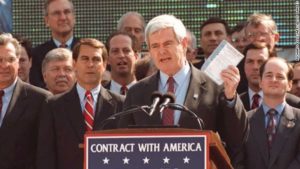Following the Earth-shattering upheaval of the election, one of the great observers of political trends wrote that, “The new American majority wants change. It especially wants leaders who will change the way Washington, D.C., conducts the public’s business.” That simple statement captured with pinpoint accuracy the mood of public opinion. But it was not written after the Trump election of 2016. It was written a generation earlier by Phil Burgess, then CEO of the Center for the New West, the premier future-focused think-tank of the 90s.
 In 1994, Republicans under Newt Gingrich had finally nationalized a congressional election with their “Contract with America.” They gained 8 seats in the Senate and 54 in the House, resulting in the first GOP-controlled Congress in 40 years, as well as flipping 10 governorships and 15 state legislatures. Gingrich predicted that if Republicans kept their “Contract” promises, they would enjoy generations of majority control. History was made that year, yet Gingrich’s prediction has not come true, and power has continued to see-saw between the two parties ever since.
In 1994, Republicans under Newt Gingrich had finally nationalized a congressional election with their “Contract with America.” They gained 8 seats in the Senate and 54 in the House, resulting in the first GOP-controlled Congress in 40 years, as well as flipping 10 governorships and 15 state legislatures. Gingrich predicted that if Republicans kept their “Contract” promises, they would enjoy generations of majority control. History was made that year, yet Gingrich’s prediction has not come true, and power has continued to see-saw between the two parties ever since.
That see-saw is not because public opinion has constantly shifted, but because it has not. Americans have been frustrated for decades about what Burgess described as “the view that government is too big, too costly, too intrusive, and too out of control.” That’s why voters ousted Jimmy Carter in 1980 when Ronald Reagan said “They’ve had their turn; now it’s our turn.” It’s the same reason voters, frustrated when George Bush broke his no-new-taxes pledge, opted instead for Bill Clinton. Nobody promised greater change than Barack Obama, so voters gave him a chance. But Washington only became more expensive and intrusive, leading to the Trump victory. In short, voters still want change, and they will switch leaders until they get it.
I was reminded of the Phil Burgess piece by the current flap about plans to move the Bureau of Land Management headquarters from Washington to Grand Junction – something Burgess and I discussed 33 years ago when then-BLM Director Bob Burford talked about how out of touch Washington administrators were.
After that 1994 election, the Hudson Institute published an influential book called “The New Promise of American Life.” The title was a takeoff from Herbert Croley’s famous “The Promise of American Life,” the 1909 book that made Theodore Roosevelt’s progressive plans the textbook for its generation. The 1994 book instead called for a complete re-examination of the federal system. Phil Burgess contributed a chapter called “Changing the Culture of Washington,” that could easily have been written yesterday, so current are its themes, conclusions, and recommendations.
Burgess is now President of the Annapolis Institute, and a popular author, columnist and speaker. As one of the top writers discussing the coming new age of telecommunication, telecommuting, and digital infrastructure, he foretold exactly how either party could capture the “new American majority” and make it their own – if they were willing to change the culture of government. It would require “refocusing” government on its primary missions, and getting it out of “micromanaging every aspect of our lives.” It required “restoring” the power of state and local governments over daily activities; “rebalancing” the relationship between government and private individuals and institutions; and “restraining” government growth. It called for major procedural reforms including a balanced budget amendment and term limits. Though the book was widely read and considered highly influential by conservatives, not a single proposed reform was ever adopted. Not a single one.
Most of all, Burgess argued persuasively for decentralizing government, mirroring the private sector trend. Modern systems not only make it feasible to do business from anywhere, but more desirable because administrators live closer to the things they administer. He called for moving not just the BLM, but the entire Interior Department. The Department of Agriculture should be in Iowa, he said, and Energy in Oklahoma. Put Treasury in New York, Labor in Detroit, HUD in Baltimore, NASA in Houston, and Immigration in San Diego. “The Washington problem, stated most simply, is this: we have a mainframe government in a PC world.”
Many leaders at the time endorsed the idea, but they didn’t really believe it. You can tell because there was never any action on it. Not even a failed attempt. Nothing.
Shirley MacLaine once said, “It’s useless to hold a person to anything he says while he’s in love, drunk, or running for office.” But as long as Washington resists change, the “new American majority” (which is no longer new) will continue to vote for people who promise to change that culture.
An edited version of this column appeared in the Grand Junction Daily Sentinel October 18, 2019.




Comments on this entry are closed.